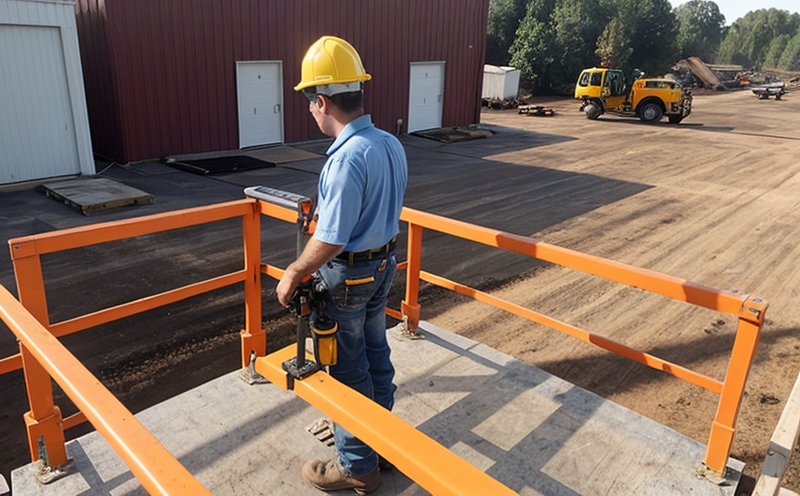Work platform inspection
The work platform inspection is a critical component of ensuring safety and compliance in industrial environments. Work platforms are essential structures used to provide safe working surfaces for personnel performing tasks at elevated heights or in confined spaces. These platforms can be found across various sectors such as construction, manufacturing, mining, and logistics.
Inspecting work platforms involves a comprehensive review of the platform's structural integrity, stability, and compliance with relevant standards. This process is crucial to prevent accidents that could result in severe injuries or fatalities. The inspection typically covers several key areas:
- Structural Integrity: Ensuring the platform's load-bearing capacity meets the design specifications and can safely support the intended loads.
- Stability: Checking that the platform remains stable under expected operational conditions, including wind loading, vibrations, and personnel movement.
- Compliance with Standards: Verifying that the work platform adheres to relevant international standards such as ISO 14756 for mobile elevated work platforms (MEWPs) or EN 369:2008 for fixed scaffolds.
The inspection process involves a combination of visual checks, non-destructive testing methods, and sometimes destructive testing. Visual inspections are the first step in identifying visible defects such as cracks, corrosion, or loose components. Non-destructive testing methods include ultrasonic testing (UT), radiographic testing (RT), magnetic particle testing (MPI), and eddy current testing (ECT). These methods help detect hidden flaws that may not be apparent during a visual inspection.
In some cases, destructive testing is necessary to assess the material properties of critical components. For example, tensile tests can determine the strength of welds or connections, while hardness tests can evaluate the wear resistance of certain materials used in the platform's construction.
The data collected during these inspections are crucial for maintaining accurate records and ensuring compliance with regulatory requirements. This information is typically documented in a detailed inspection report that includes:
- Description of the work platform
- Results of all inspections conducted
- Listings of any defects or issues found
- Recommendations for repairs or replacements
- Compliance with relevant standards and regulations
The inspection process is not a one-time event but an ongoing commitment to safety. Regular inspections, typically annual or bi-annual depending on the platform's usage and environment, ensure that any potential issues are addressed before they escalate into critical problems.
By focusing on these key aspects of work platform inspection, we can maintain safe working conditions for personnel across various industries. This ensures not only compliance with regulatory requirements but also a safer workplace overall.
Why It Matters
The safety and integrity of work platforms directly impact the well-being of workers and the efficiency of operations in many sectors. Regular inspections are vital for preventing accidents that could result from structural failures or non-compliance with standards. These inspections help identify potential hazards early, allowing for timely repairs and replacements.
For quality managers and compliance officers, ensuring that work platforms meet safety standards is a critical responsibility. Non-compliance can lead to fines, legal action, and reputational damage. By conducting thorough inspections, these professionals contribute significantly to maintaining a safe working environment and upholding regulatory requirements.
R&D engineers play a crucial role in the design and development of work platforms. Regular inspections provide valuable data on the performance and durability of new materials and designs. This information can be used to refine future iterations, ensuring that they meet or exceed current standards and anticipate future safety needs.
For procurement professionals, selecting suppliers who adhere to strict inspection protocols ensures the quality and reliability of purchased work platforms. By working with trusted suppliers who prioritize safety and compliance, these professionals contribute to a safer workplace and reduce the risk of incidents associated with poorly manufactured or maintained equipment.
Applied Standards
The inspection of work platforms is governed by several international standards that provide guidelines for ensuring structural integrity and compliance with safety regulations. These include:
- ISO 14756-1 (Mobile Elevated Work Platforms): This standard specifies the requirements for mobile elevating work platforms, including their design, construction, and operation.
- EN 369:2008 (Fixed Scaffolding): This European standard covers fixed scaffolds used in various industrial applications.
- ASME PASE-1: The American Society of Mechanical Engineers' Pressure Vessel Code, which includes provisions for work platforms that are pressure vessels.
- CAN/CSA-Z240.3-M95 (Portable Scaffolding): This Canadian standard specifies the design and use of portable scaffolding.
In addition to these standards, local regulations may also apply depending on the geographical location. It is essential for inspectors and operators to be aware of all relevant standards and regulations applicable to their specific work platforms.
Eurolab Advantages
At Eurolab, we offer a comprehensive suite of services designed to meet the rigorous inspection requirements for work platforms. Our team of expert inspectors and engineers is equipped with the latest technology and expertise to ensure thorough and accurate inspections.
- Comprehensive Inspections: We provide detailed inspections that cover all critical aspects of structural integrity, stability, and compliance.
- Advanced Testing Methods: Utilizing ultrasonic testing (UT), radiographic testing (RT), magnetic particle testing (MPI), and eddy current testing (ECT) to detect hidden defects.
- Destructive Testing: Where necessary, we conduct destructive tests to assess the material properties of critical components.
- Comprehensive Reporting: Our detailed inspection reports provide a clear overview of the platform's condition and compliance with relevant standards.
- Regulatory Compliance: Ensuring that all inspections meet or exceed local and international regulatory requirements.
- Expertise in Various Sectors: Our inspectors have experience working across various industries, including construction, manufacturing, mining, and logistics.
We pride ourselves on providing reliable and accurate inspection services that contribute to a safer workplace. By partnering with Eurolab for your work platform inspections, you can rest assured that your equipment is in the hands of experts who understand the critical importance of safety and compliance.





